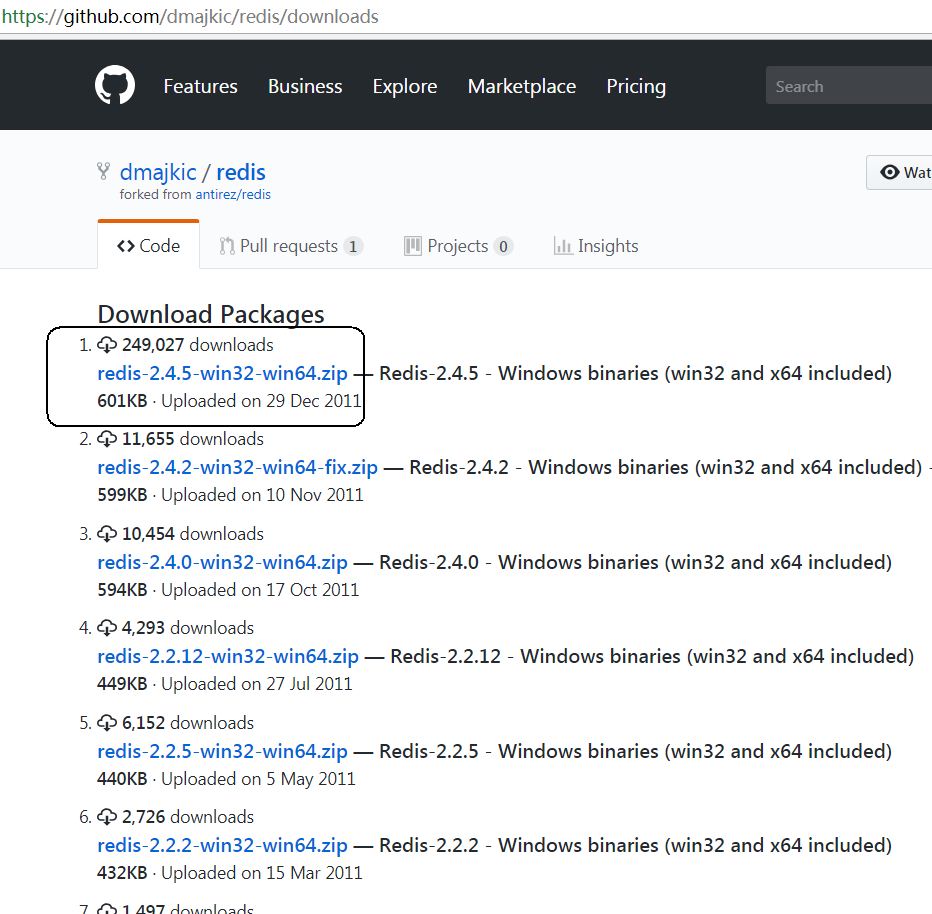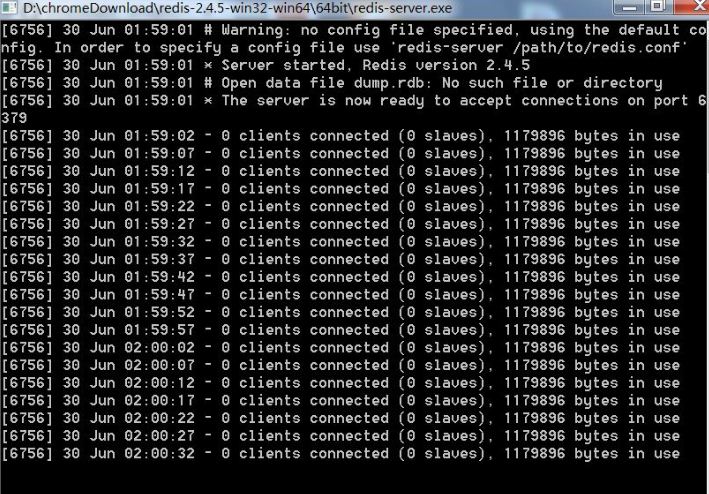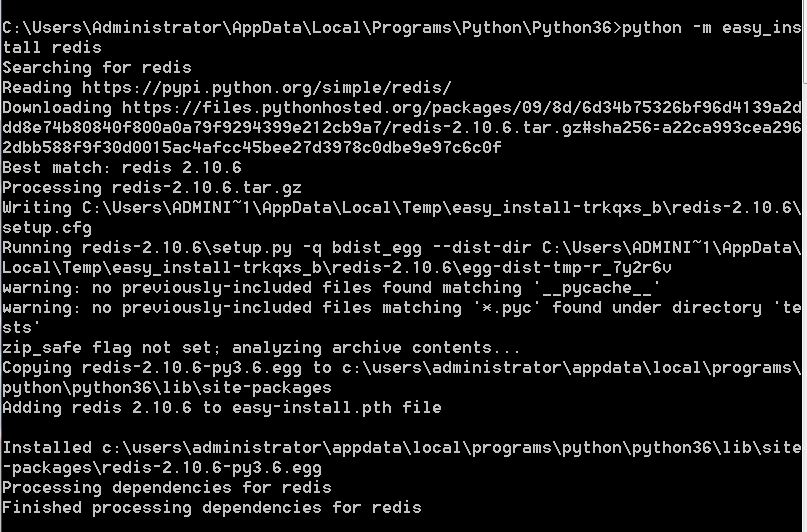这篇文章主要是想介绍下Windows环境下Redis安装方法。
Redis是一个速度非常快的非关系数据库(non-releational database),它可以存储健(key)与5种不同类型的值(value)之间的映射(mapping),还可以将存储在内存的健值对数据持久化到硬盘,可以使用复制特性来扩展性能,还可以使用客户的分片来扩展写性能。要学习的内容还有很多,先介绍下Windows环境下安装于调试过程。
在Windows环境下安装Redis其实并不推荐,原因种种,其中最主要的是redis在将数据持久化到硬盘的时候,需要用到fork(一个进程,包括代码、数据和分配给进程的资源。fork()函数通过系统调用创建一个与原来进程几乎完全相同的进程,也就是两个进程可以做完全相同的事,但如果初始参数或者传入的变量不同,两个进程也可以做不同的事。)系统调用,而Windows并不支持这个调用。
如果了解了这些还想在Windows环境下安装Redis,那么请看下面过程。
- 首先访github页面https://github.com/dmajkic/redis/downloads ,根据你的正在使用的Windows版本,下载适用于32位系统或者是64位系统的预编译redis
以我的电脑为例

下载解压完之后,双击redis-server.exe这个可执行文件,就可以启动redis服务了。启动如下图:

- 在Windows上安装Python
如果安装过的老铁请忽略。Python下载地址https://www.python.org/ftp/python/3.6.3/python-3.6.3-amd64.exe
这里以Python的3.6版本为例。安装好以后可以cmd命令验证下

- 在Windows上为Python安装Redis客户端
首先通过命令行来安装setuptools包,然后再通过setuptools包安装easy_install工具。进入到ez_setup.py目录,运行python ez_setup.py

这个ez_setup.py文件可以从网上下载。这里我也提供下代码,把这段代码复制黏贴到ez_setup.py文件即可。
#!/usr/bin/env python """ Setuptools bootstrapping installer. Maintained at https://github.com/pypa/setuptools/tree/bootstrap. Run this script to install or upgrade setuptools. This method is DEPRECATED. Check https://github.com/pypa/setuptools/issues/581 for more details. """ import os import shutil import sys import tempfile import zipfile import optparse import subprocess import platform import textwrap import contextlib from distutils import log try: from urllib.request import urlopen except ImportError: from urllib2 import urlopen try: from site import USER_SITE except ImportError: USER_SITE = None # 33.1.1 is the last version that supports setuptools self upgrade/installation. DEFAULT_VERSION = "33.1.1" DEFAULT_URL = "https://pypi.io/packages/source/s/setuptools/" DEFAULT_SAVE_DIR = os.curdir DEFAULT_DEPRECATION_MESSAGE = "ez_setup.py is deprecated and when using it setuptools will be pinned to {0} since it's the last version that supports setuptools self upgrade/installation, check https://github.com/pypa/setuptools/issues/581 for more info; use pip to install setuptools" MEANINGFUL_INVALID_ZIP_ERR_MSG = 'Maybe {0} is corrupted, delete it and try again.' log.warn(DEFAULT_DEPRECATION_MESSAGE.format(DEFAULT_VERSION)) def _python_cmd(*args): """ Execute a command. Return True if the command succeeded. """ args = (sys.executable,) + args return subprocess.call(args) == 0 def _install(archive_filename, install_args=()): """Install Setuptools.""" with archive_context(archive_filename): # installing log.warn('Installing Setuptools') if not _python_cmd('setup.py', 'install', *install_args): log.warn('Something went wrong during the installation.') log.warn('See the error message above.') # exitcode will be 2 return 2 def _build_egg(egg, archive_filename, to_dir): """Build Setuptools egg.""" with archive_context(archive_filename): # building an egg log.warn('Building a Setuptools egg in %s', to_dir) _python_cmd('setup.py', '-q', 'bdist_egg', '--dist-dir', to_dir) # returning the result log.warn(egg) if not os.path.exists(egg): raise IOError('Could not build the egg.') class ContextualZipFile(zipfile.ZipFile): """Supplement ZipFile class to support context manager for Python 2.6.""" def __enter__(self): return self def __exit__(self, type, value, traceback): self.close() def __new__(cls, *args, **kwargs): """Construct a ZipFile or ContextualZipFile as appropriate.""" if hasattr(zipfile.ZipFile, '__exit__'): return zipfile.ZipFile(*args, **kwargs) return super(ContextualZipFile, cls).__new__(cls) @contextlib.contextmanager def archive_context(filename): """ Unzip filename to a temporary directory, set to the cwd. The unzipped target is cleaned up after. """ tmpdir = tempfile.mkdtemp() log.warn('Extracting in %s', tmpdir) old_wd = os.getcwd() try: os.chdir(tmpdir) try: with ContextualZipFile(filename) as archive: archive.extractall() except zipfile.BadZipfile as err: if not err.args: err.args = ('', ) err.args = err.args + ( MEANINGFUL_INVALID_ZIP_ERR_MSG.format(filename), ) raise # going in the directory subdir = os.path.join(tmpdir, os.listdir(tmpdir)[0]) os.chdir(subdir) log.warn('Now working in %s', subdir) yield finally: os.chdir(old_wd) shutil.rmtree(tmpdir) def _do_download(version, download_base, to_dir, download_delay): """Download Setuptools.""" py_desig = 'py{sys.version_info[0]}.{sys.version_info[1]}'.format(sys=sys) tp = 'setuptools-{version}-{py_desig}.egg' egg = os.path.join(to_dir, tp.format(**locals())) if not os.path.exists(egg): archive = download_setuptools(version, download_base, to_dir, download_delay) _build_egg(egg, archive, to_dir) sys.path.insert(0, egg) # Remove previously-imported pkg_resources if present (see # https://bitbucket.org/pypa/setuptools/pull-request/7/ for details). if 'pkg_resources' in sys.modules: _unload_pkg_resources() import setuptools setuptools.bootstrap_install_from = egg def use_setuptools( version=DEFAULT_VERSION, download_base=DEFAULT_URL, to_dir=DEFAULT_SAVE_DIR, download_delay=15): """ Ensure that a setuptools version is installed. Return None. Raise SystemExit if the requested version or later cannot be installed. """ to_dir = os.path.abspath(to_dir) # prior to importing, capture the module state for # representative modules. rep_modules = 'pkg_resources', 'setuptools' imported = set(sys.modules).intersection(rep_modules) try: import pkg_resources pkg_resources.require("setuptools>=" + version) # a suitable version is already installed return except ImportError: # pkg_resources not available; setuptools is not installed; download pass except pkg_resources.DistributionNotFound: # no version of setuptools was found; allow download pass except pkg_resources.VersionConflict as VC_err: if imported: _conflict_bail(VC_err, version) # otherwise, unload pkg_resources to allow the downloaded version to # take precedence. del pkg_resources _unload_pkg_resources() return _do_download(version, download_base, to_dir, download_delay) def _conflict_bail(VC_err, version): """ Setuptools was imported prior to invocation, so it is unsafe to unload it. Bail out. """ conflict_tmpl = textwrap.dedent(""" The required version of setuptools (>={version}) is not available, and can't be installed while this script is running. Please install a more recent version first, using 'easy_install -U setuptools'. (Currently using {VC_err.args[0]!r}) """) msg = conflict_tmpl.format(**locals()) sys.stderr.write(msg) sys.exit(2) def _unload_pkg_resources(): sys.meta_path = [ importer for importer in sys.meta_path if importer.__class__.__module__ != 'pkg_resources.extern' ] del_modules = [ name for name in sys.modules if name.startswith('pkg_resources') ] for mod_name in del_modules: del sys.modules[mod_name] def _clean_check(cmd, target): """ Run the command to download target. If the command fails, clean up before re-raising the error. """ try: subprocess.check_call(cmd) except subprocess.CalledProcessError: if os.access(target, os.F_OK): os.unlink(target) raise def download_file_powershell(url, target): """ Download the file at url to target using Powershell. Powershell will validate trust. Raise an exception if the command cannot complete. """ target = os.path.abspath(target) ps_cmd = ( "[System.Net.WebRequest]::DefaultWebProxy.Credentials = " "[System.Net.CredentialCache]::DefaultCredentials; " '(new-object System.Net.WebClient).DownloadFile("%(url)s", "%(target)s")' % locals() ) cmd = [ 'powershell', '-Command', ps_cmd, ] _clean_check(cmd, target) def has_powershell(): """Determine if Powershell is available.""" if platform.system() != 'Windows': return False cmd = ['powershell', '-Command', 'echo test'] with open(os.path.devnull, 'wb') as devnull: try: subprocess.check_call(cmd, stdout=devnull, stderr=devnull) except Exception: return False return True download_file_powershell.viable = has_powershell def download_file_curl(url, target): cmd = ['curl', url, '--location', '--silent', '--output', target] _clean_check(cmd, target) def has_curl(): cmd = ['curl', '--version'] with open(os.path.devnull, 'wb') as devnull: try: subprocess.check_call(cmd, stdout=devnull, stderr=devnull) except Exception: return False return True download_file_curl.viable = has_curl def download_file_wget(url, target): cmd = ['wget', url, '--quiet', '--output-document', target] _clean_check(cmd, target) def has_wget(): cmd = ['wget', '--version'] with open(os.path.devnull, 'wb') as devnull: try: subprocess.check_call(cmd, stdout=devnull, stderr=devnull) except Exception: return False return True download_file_wget.viable = has_wget def download_file_insecure(url, target): """Use Python to download the file, without connection authentication.""" src = urlopen(url) try: # Read all the data in one block. data = src.read() finally: src.close() # Write all the data in one block to avoid creating a partial file. with open(target, "wb") as dst: dst.write(data) download_file_insecure.viable = lambda: True def get_best_downloader(): downloaders = ( download_file_powershell, download_file_curl, download_file_wget, download_file_insecure, ) viable_downloaders = (dl for dl in downloaders if dl.viable()) return next(viable_downloaders, None) def download_setuptools( version=DEFAULT_VERSION, download_base=DEFAULT_URL, to_dir=DEFAULT_SAVE_DIR, delay=15, downloader_factory=get_best_downloader): """ Download setuptools from a specified location and return its filename. `version` should be a valid setuptools version number that is available as an sdist for download under the `download_base` URL (which should end with a '/'). `to_dir` is the directory where the egg will be downloaded. `delay` is the number of seconds to pause before an actual download attempt. ``downloader_factory`` should be a function taking no arguments and returning a function for downloading a URL to a target. """ # making sure we use the absolute path to_dir = os.path.abspath(to_dir) zip_name = "setuptools-%s.zip" % version url = download_base + zip_name saveto = os.path.join(to_dir, zip_name) if not os.path.exists(saveto): # Avoid repeated downloads log.warn("Downloading %s", url) downloader = downloader_factory() downloader(url, saveto) return os.path.realpath(saveto) def _build_install_args(options): """ Build the arguments to 'python setup.py install' on the setuptools package. Returns list of command line arguments. """ return ['--user'] if options.user_install else [] def _parse_args(): """Parse the command line for options.""" parser = optparse.OptionParser() parser.add_option( '--user', dest='user_install', action='store_true', default=False, help='install in user site package') parser.add_option( '--download-base', dest='download_base', metavar="URL", default=DEFAULT_URL, help='alternative URL from where to download the setuptools package') parser.add_option( '--insecure', dest='downloader_factory', action='store_const', const=lambda: download_file_insecure, default=get_best_downloader, help='Use internal, non-validating downloader' ) parser.add_option( '--version', help="Specify which version to download", default=DEFAULT_VERSION, ) parser.add_option( '--to-dir', help="Directory to save (and re-use) package", default=DEFAULT_SAVE_DIR, ) options, args = parser.parse_args() # positional arguments are ignored return options def _download_args(options): """Return args for download_setuptools function from cmdline args.""" return dict( version=options.version, download_base=options.download_base, downloader_factory=options.downloader_factory, to_dir=options.to_dir, ) def main(): """Install or upgrade setuptools and EasyInstall.""" options = _parse_args() archive = download_setuptools(**_download_args(options)) return _install(archive, _build_install_args(options)) if __name__ == '__main__': sys.exit(main())
安装ez_setup模块会辅助下载并安装setuptools,而setuptools可以方便的下载并安装redis客户端。接下来我们使用setuptools的easy_install模块下载redis,进入到Python36目录,运行python –m easy_install redis.

- Redis,你好!
安装好redis以后,我们来测试下效果。首先还是启动python,导入redis客户端库。
>>>import redis
创建一个指向redis链接
>>>conn = redis.Redis()
设置一个值
>>>conn.set(‘hello’ , ‘feimao’)
然后通过获取返回值来判断设置成功与否
>>>conn.get(‘hello’)

如果验证成功了,那么恭喜你,^_^。Windows环境安装redis说明你已经get了。让我们在后续的博客中继续踏上redis之旅吧~